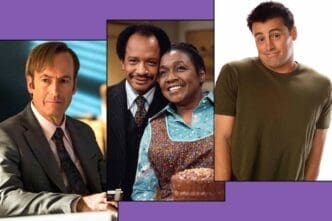In the world of television, spinoff shows are a gamble. They can either capture the magic of the originals, like “NCIS,” or flop spectacularly, like “AfterMASH.” Here, we’ll explore the spinoffs that soared and those that stumbled, to see if your personal picks made the list.
Kicking off the list of triumphs, “A Different World” captivated audiences by taking Denise Huxtable from “The Cosby Show” to the fictional Hillman College. Guided by Debbie Allen from season two, this show boldly tackled themes of sexuality and race, winning over viewers with its engaging narratives.
In a different style, “Law & Order: Special Victims Unit” stood out by focusing on character development alongside crime-solving. Mariska Hargitay’s portrayal of Olivia Benson elevated the series as she navigated complex personal and professional challenges, including a will-they, won’t-they dynamic with Elliot Stabler.
While “Angel” offered a darker narrative spin on the “Buffy the Vampire Slayer” universe, its ability to blend broody themes with light-hearted humor earned it a dedicated fanbase. Similar success was seen with “Benson,” where Robert Guillaume shone in a spinoff that deftly handled social issues while entertaining audiences.
Meanwhile, “The Good Fight” offered a raw reflection of contemporary political angst, driven by Christine Baranski’s powerful performance as Diane Lockhart. It was unafraid to confront contentious subjects relevant to its audience, making it both a critical and social success.
“Laverne and Shirley” charmed viewers with its comedic portrayal of working-class life, evolving from guest appearances on “Happy Days” to beloved TV icons in their own right. Likewise, “NCIS,” a spinoff from “JAG,” maintained robust popularity through its well-crafted blend of action and humor.
“The Jeffersons” pushed boundaries with its portrayal of race and class, offering sharp, timeless comedy. Similarly, “Frasier” turned a supporting “Cheers” character into the lead of a show that celebrated sophisticated wit and farce over a successful run.
At the pinnacle, “Better Call Saul” impressed by building on the success of “Breaking Bad.” With Bob Odenkirk’s nuanced performance, the show intricately explored the transformation of Jimmy McGill into the morally compromised Saul Goodman.
Turning to the less fortunate, “Living Dolls” struggled to find a foothold despite Halle Berry’s involvement, leading to its quick cancellation. “Saved by the Bell: The College Years” also failed to resonate, paling in comparison to its high school predecessor.
“Time of Your Life” never hit its stride, and “AfterMASH” failed to capture the spirit of “M*A*S*H,” lacking identity and the sharp writing that made the original a classic.
“The Girl From U.N.C.L.E.” struggled with unconvincing plots and performances, while “Baywatch Nights” absurdly attempted to introduce supernatural elements to a show about lifeguarding.
“Phyllis,” despite Cloris Leachman’s talent, couldn’t match the success of “The Mary Tyler Moore Show,” and “Joanie Loves Chachi” didn’t capture the charm of “Happy Days.” “Joey,” left without his “Friends,” fell flat, and “The Brady Brides” failed to engage audiences with its marital mishaps.
Spinoffs remain a risky venture in television, offering the potential for either outstanding success or notable failure. While some have managed to leave a lasting impact with innovative storytelling and character development, others faded quickly, serving as cautionary tales on the challenges of creating compelling narratives outside their original context.
Source: Yahoo ˙ Youtube







